JEYARAJ ( 'J...' ) THE MAN AND THE ARTIST |
|
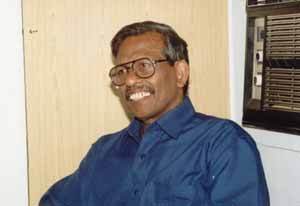 Any Tamilian worth his name cannot feign
ignorance of Jeyaraj, the prolific artist in the domain
of Tamil periodicals and magazines. His versatility in
the realm of commercial illustration is unbounded and
also unprecedented. Be it line-drawing, wash drawing,
colour drawing, perspective drawing or cartoons, he
excelled in everything . Any Tamilian worth his name cannot feign
ignorance of Jeyaraj, the prolific artist in the domain
of Tamil periodicals and magazines. His versatility in
the realm of commercial illustration is unbounded and
also unprecedented. Be it line-drawing, wash drawing,
colour drawing, perspective drawing or cartoons, he
excelled in everything . |
|
| After the popularity and fame, actors get in the cinema field, he proved that the same popularity and fame can also be achieved by an illustrator, which is all the more greater, because the readers of magazines are literate people! | |
| However the name and fame luckily did not
go into his head that even today he is a simple man and
by his own admission stated that he does not have any set
goal in his life and takes life as it unfolds. This much 'interviewed' man by almost all the satellite channels in the south and Doordarshan, was manavai.com's target for a very special reason that he belonged to the south-eastern seaboard near Manapad. When contacted he gladly accepted for the 'Interview' in spite of his tight schedule. |
|
| Fritz Miranda and Velgean, a new adherent
to the web site were assigned to do the job and between
themselves they struck an ingenious idea to interview
Jeyaraj on two different facets of his life with the view
to bring out the artist and the man within the famed
artist. The interview is in two parts. First Fritz
Miranda tries to bring out the artist within the man and
Velgean tries to bring out the man within the artist! OK, we don't want to test your patience, go ahead and enjoy the outcome! |
|
|
|
PART-I - The Artist within the Man Interview by Fritz Miranda |
|
|
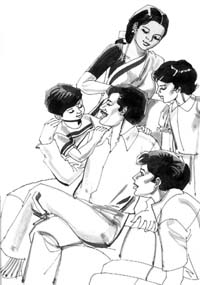 F.M. You are a very busy artist. What is your routine on an average day? In fact when do you start work every day? J. Getting up in the morning is not fixed! It depends upon the time I go to sleep on the previous night, which is usually very late. Some times it will be morning 4.00 a.m. No! My profession is riddled with deadlines! A strict routine is not possible- atleast for me. |
||
| F.M. Yes,
deadlines! How do you manage to keep up the deadlines? J. Most of the magazines I contribute are weeklies, hence deadlines are very important. Time management in a commercial artist's profession is very difficult. At the same time you cannot ignore the urgency. But over the years I have developed a subconscious "routine" which will meet the deadlines. Further a seventh sense that is my wife, will keep on reminding me the priority, which had served the purpose! |
||
| F.M. Did
this strategy worked well all these years to meet the
deadlines? J. Certainly, otherwise I could not have kept pace with the competition. Further, the speed with which I finish my drawings was also another important factor. |
||
J. I am able to do today, even certain difficult physical acts like climbing a tree, which I did in my youth. Further I never got old in the mind and never will! An old man may regret that he had lost his youth, but he will never fail to admire and like youthfulness. That is the secret. |
||
| F.M. You
are sometimes 'mischievous' in your drawing, particularly
when girls are shown wearing T' shirts! Comment please! J. Of course! Yes. I revelled at one time when there came out of my brush a spate of T' shirts ! The most popular one was a buxom girl wearing a T'shirt with the words "The hills are alive" which was the opening lines of the theme song of that famous musical "The Sound of Music". It brought me both bouquets and brickbats alike! But believe me, all the educated and cultured people liked such mischievous musings of the brush. A few could have objected, but I don't regret. |
||
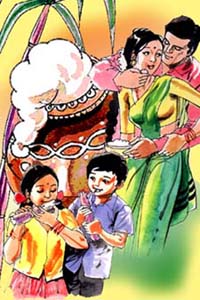 F.M. I have
read that you did not have any formal schooling in art
and drawing. One can draw without proper art education,
but how it is possible for you to have the "Colour
sense", which I understand needs certain theoretical
knowledge , which is taught only at Art schools ? F.M. I have
read that you did not have any formal schooling in art
and drawing. One can draw without proper art education,
but how it is possible for you to have the "Colour
sense", which I understand needs certain theoretical
knowledge , which is taught only at Art schools ? J. A very good question! Only a person who knows the intricacies of art can ask this question. I never thought that I am self sufficient in my knowledge of art, I was always willing to learn. Whenever I wanted to know the nuances in a particular technique, I went to the books. Learning is part of my life, it is a never ending process. Further whatever you may learn in text books about colour sense, but you learn the real colour consciousness only by observation in true life situations. It is not forced, that quality should come to you naturally. Sometime I even manipulate the colours if they are not balanced in nature. |
||
| F.M. Do
you have your first published drawings with you ? J. The answer is Yes and No. Yes - in the sense I have a copy of it. No-because I don't have the original! It was a picture I drew for "Kumudam". An Indian ink line drawing in which a professor gets it hot from the Principal, while his students, a boy and girl peep through the door. In the next issue itself some letters of appreciation for that picture was published. I never looked back after that. |
||
| F.M. Do
you preserve now your originals? J. This needs some explanation. In the west an artist's pictures are paid only for publication and the picture is returned to them after the printing process is over. But here in India the picture itself is deemed to have been bought by the publishers of the magazines. Hence I do not have most of the originals. However whenever I get the opportunity to exhibit my works, I manage to get selected pictures from the publishers of the magazines. Some of these had come to stay with me. These I have. |
||
J. I would certainly love to do that. But the reality of publishing a book is very harsh. Publishing, that too in colour is now very expensive. Further it needs a lot of manual work like sorting, selection etc., and preparation of a theme or presentation technique for which one has to burn a lot of midnight oil. No - I don't have the time. |
||
| F.M. How
about if some one sponsors the project? J. Still I will have to work towards it. It needs very systematic effort, which I do not have. May be when I am free from my regular work, I may contemplate on your suggestion. |
||
| F.M. What
support you get from your family members in your career? J. Right from the early period of my career, my wife had been my Personal Secretary arranging my engagements, my commitment to deadlines, distribution of the finished pictures to the publishers etc., etc. She reads the stories sent to me for illustrations and points out the situations fit for drawing. Without her I would have been a complete wreck. Hats off to her! Apart from her, everyone in the house contribute some help to me for which I am grateful, however small it may be. |
||
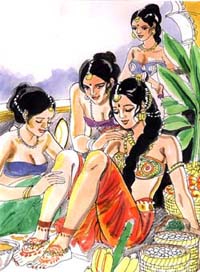 F.M. How do you manage social functions amidst your tight schedule? J. Here also it is my wife who keeps a schedule of important functions we have to attend and when I am bound to my work she attends the functions herself and finds suitable excuses for my absence! |
||
| F.M. At
the time of your marriage you could not have been the
famous artist as you are now. Then, how did your
father-in-law find a groom in you for his daughter, when
people looked upon the salaried young men as the most
eligible bachelors! J. What you say is very true. It is true that people saw material well being as insurance for a good married life. But people in those days were not money minded to the core, they also saw the family background from which the boy came. I had this solid qualification for me. My family was a much-respected one. People from all walks of life including eminent lawyers in the neighbourhood came to my father for advice on worldly matters. Further inspite of myself being a freelance artist, even in those days I earned more than what a Government Office Superintendent was earning. |
||
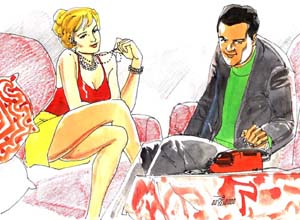 F.M. I am
happy to have met you - a famous artist, in person! F.M. I am
happy to have met you - a famous artist, in person! J. No- the pleasure is mine, but for admirers like you, one cannot dream to be famous. In fact I owe that to you. God bless you! |
||
Mr.Jeyaraj may be contacted at his email address : jeyarajartist@hotmail.com |
||
|
||